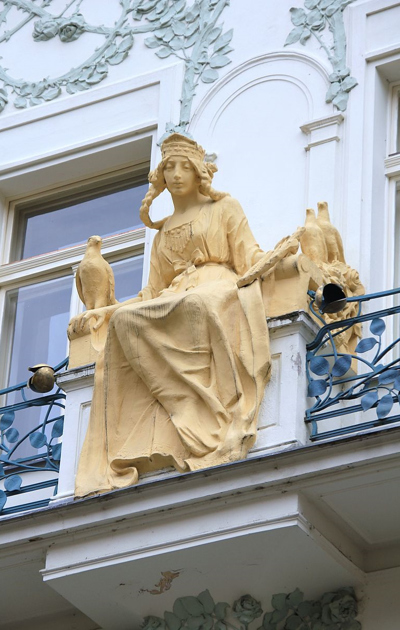Maeve
https://en.wikipedia.org/wiki/Libu%C5%A1e
Princess Libuše
Libuše is said to have been the youngest daughter of the equally mythical Czech ruler Krok. The legend goes that she was the wisest of the three sisters, and while her sister Kazi was a healer and Teta was a magician, she had the gift of seeing the future, and was chosen by her father as his successor, to judge over the people. According to legends she prophesied from her castle at Libušín, though later legends say it was Vyšehrad.
Legend says that Libuše came out on a rocky cliff high above the Vltava and prophesied: "I see a great city whose glory will touch the stars." On the site she ordered to build a castle and a town called Prague.[3]
Although she proved herself as a wise chieftain, the male part of the tribe was displeased that their ruler was a woman and demanded that she marry, but she had fallen in love with a ploughman, Přemysl. She
davy.vangoethem
4 chapters
15 Apr 2020
Appendix: Princess Libuše
Praha, Czech Republic
https://en.wikipedia.org/wiki/Libu%C5%A1e
Princess Libuše
Libuše is said to have been the youngest daughter of the equally mythical Czech ruler Krok. The legend goes that she was the wisest of the three sisters, and while her sister Kazi was a healer and Teta was a magician, she had the gift of seeing the future, and was chosen by her father as his successor, to judge over the people. According to legends she prophesied from her castle at Libušín, though later legends say it was Vyšehrad.
Legend says that Libuše came out on a rocky cliff high above the Vltava and prophesied: "I see a great city whose glory will touch the stars." On the site she ordered to build a castle and a town called Prague.[3]
Although she proved herself as a wise chieftain, the male part of the tribe was displeased that their ruler was a woman and demanded that she marry, but she had fallen in love with a ploughman, Přemysl. She

therefore related a vision in which she saw a farmer with one broken sandal, ploughing a field, or in other versions of the legend, eating from an iron table. She instructed her councilmen to seek out this man by letting a horse loose at a junction; they followed it to the village of Stadice and found Přemysl exactly as she had said (either ploughing a field, or using an iron plough as a makeshift table). The two grandees who found Přemysl brought him to the princely palace where Libuše married him, and Přemysl the Ploughman thus became ruler. They went on to have three sons: Radobyl, Lidomir, and Nezamysl who continued the Přemyslid dynasty in the Czech lands.
In another legend, she commanded her councillors to found a city at the place where they found a man making the best of use of his teeth at midday. They set off and at midday found a man sawing a block of wood (using his saw's teeth) when everyone else was eating; when they asked him what he was making he replied "Prah" (which in Czech means "threshold") and so Libuše named the city Prague
Share your travel adventures like this!
Create your own travel blog in one step
Share with friends and family to follow your journey
Easy set up, no technical knowledge needed and unlimited storage!
© 2025 Travel Diaries. All rights reserved.